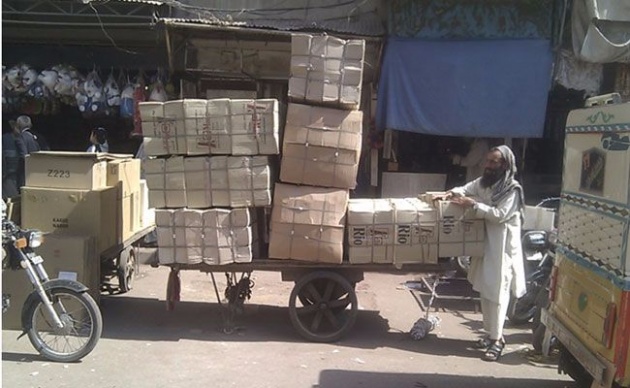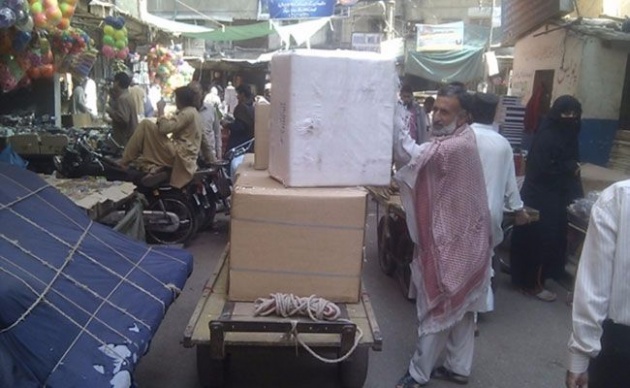
Habib Zaman (shown in the above image) was going to earn only Rs. 100 ($1) for delivering that huge pile of goods he was pulling from a storage house to a shop in Bolton Market.
Habib Zaman is one of the many labourers known as Hamalis who pull hundreds of kilograms of goods with the help of their two-wheeled hand-pulled trollies during long days at Bolton Market. When the work is good, he takes home 400 to 500 rupees ($4-$5) a day. Many days, he doesn’t even earn that much.
During normal times, daily wage earners like Zaman succeed in getting work 24 to 25 days a month and thus make somewhere in the range of 11,000 and 14,000 rupees ($110 to $140) monthly. That’s way too little to support Zaman’s family of five who lives hundreds of miles away from him in his hometown of Hazara, which is located in Khyber Pakhtunkhwa province.
Yet Zaman, 41, appears content with whatever he earns these days because the law-and-order situation in the market is much better than it has been in recent years. Before a recent crackdown on extortion and crime, this port city saw several years of violence that claimed thousands of lives.

Now, even though the security situation in the market has improved, Zaman’s working days shrink when political parties call for general strikes in the city. That makes his already difficult life, and that of thousands of other daily wage earners, even harder. “Our wages are already very low but we get even more exploited when there isn’t enough work available in the market,” he says.
Zaman shares a residence with some relatives in North Nazimabad, a town located about 17 to 18 kilometers from the market, a huge retail and wholesale market located in old city area where several billions of rupees change hands every single day. Just getting to work takes a chunk of his earnings.
“I have to spend 40 to 50 rupees every day to travel to work and back,” says Zaman. He adds, “It is extremely important for me to save whatever I can to be able to send home enough to support my family.”
So far, the government hasn’t been helping. The provincial government has not reduced local bus fares even though the prices of petroleum products have declined by about 35 percent during the past three to four months. Bus fare still stands where it was one year ago when the price for diesel fuel was around Rs. 118 per liter. Today the price of high-speed diesel (HSD) is Rs80.61.
Ali Akbar is another Hamali who works in the market’s crowded streets. He came to Karachi from Bajaur, an area located in the northern part of the country that until a few years ago was a stronghold of Taliban militants. The Pakistan Army engaged in a major military operation in the area to fight the insurgents but Akbar hasn’t returned.
“Today, Bajaur is a peaceful place to live but there isn’t enough employment there to make a living,” replied Akbar when asked why he chose to move away from his family and live in Karachi.
Many shopkeepers in Bolton Market express the view that the combined impact of better security, lower fuel prices and reduced interest rates has boosted the area’s business activity. But Hamalis like Akbar and Zaman are still waiting to feel the trickledown effect.



